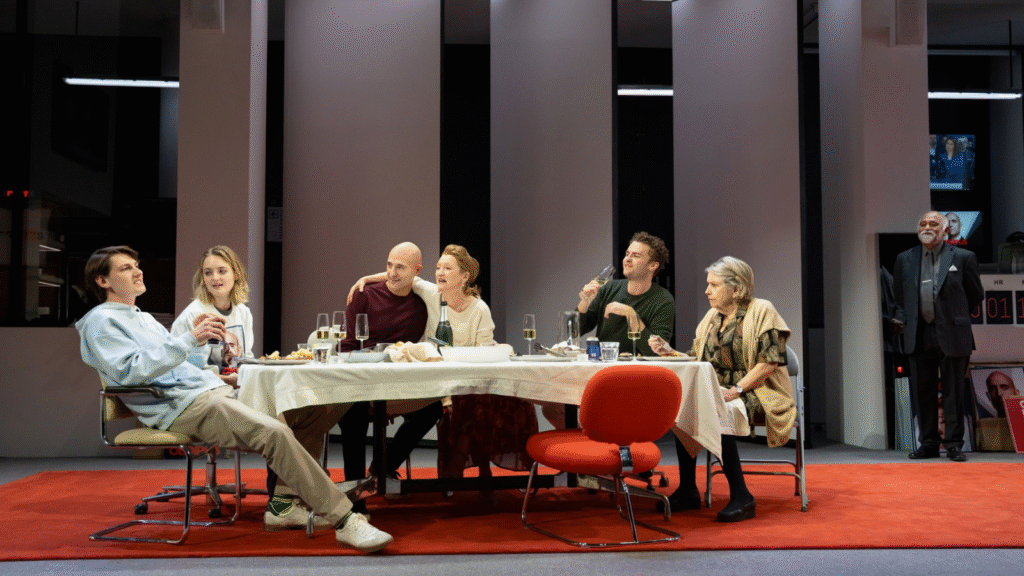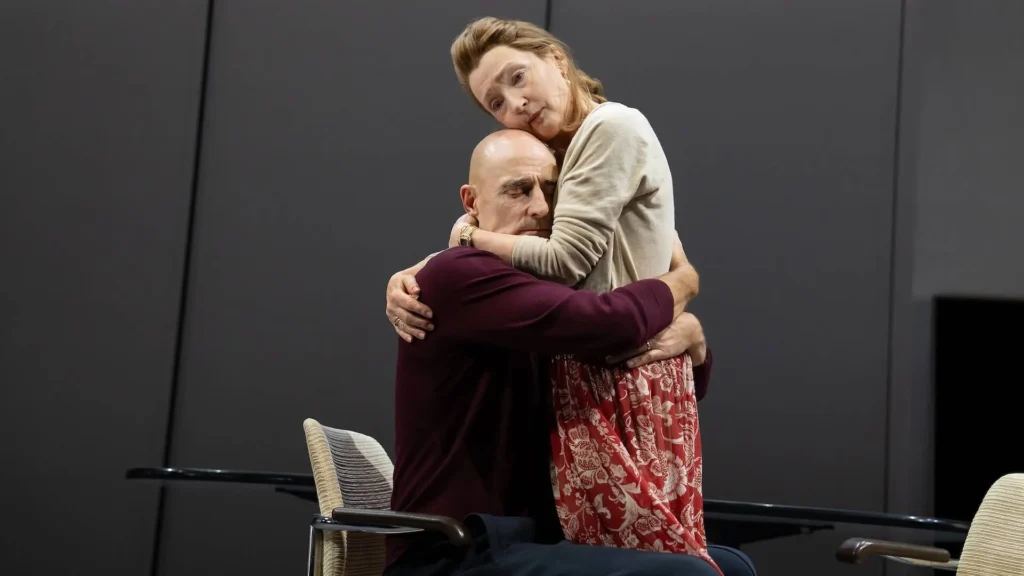By Carol Rocamora…
Icke’s modern-day version of Oedipus is even more horrific than the original, written millennia ago
How can we bear to sit through another production of Oedipus, since we all know its horrifying ending?
That’s the problem with the greatest tragedy in world theatre, written 2500 years ago. The unfortunate protagonist is doomed from the beginning. We know it; he doesn’t. And oh, the agony when the poor fellow finally finds out the terrible truth, and we have to watch him face the consequences.
Nevertheless, once again it’s made mesmerizing – indeed, sensational – in the hands of British director/adapter Robert Icke, who certainly knows his way around the Greeks. His riveting Oresteia, set in modern times, gripped audiences at the Park Armory, where it played there in 2022 after garnering rave reviews in London at the Almeida Theatre.
Once again, Icke is continuing his winning Greek streak – with Oedipus, now playing at Studio 54. He has updated Sophocles’s 431 BC tragedy, setting it in a suspenseful modern context bound to capture everyone’s attention – namely, a high-stakes political election. Oedipus (played by a powerful Mark Strong) is running for prime minister of an unnamed first-world country. It’s election night, and his family and staff are gathered around him in campaign headquarters (the slick contemporary design is by Hildegarde Bechtler). A huge digital clock dominates the wall, indicating the number of hours and minutes left before the results are announced.

But we in the audience, who know the ending before anyone else on stage does, are riveted to the clock for a far more urgent reason. We’re awaiting the moment when Oedipus learns the devastating truth – that he killed his father, and subsequently married his mother.
Icke has made several changes, in addition to the updating. Oedipus was already king in the original; here, he’s a candidate for prime minister. The production opens with slick news coverage projected on a huge screen (video design by Tal Yarden), where Oedipus tells the people that he intends to release his birth certificate showing he came from “peasant stock” and didn’t marry the former leader’s wife for political reasons. Thereby, he hopes to gain their respect and trust.
There are more changes: Icke has also added characters not present in the original, including three of his four children – Polyneices (James Wilbraham), Eteocles (Jordan Scowen), and Antigone (Olivia Reis), who appear in later tragedies. The celebratory family interaction on election night only makes the final outcome more devastating.
Meanwhile, Icke preserves the essential character of Teiresias, a blind soothsayer in the original and a fortuneteller here (played by Samuel Brewer). He’s kept the crucial scene in the original, wherein Teiresias appears and prophesies: “You will be forced to see who you are… your father’s killer and your mother’s lover…You’ll wish you were blind.”
Other changes: Whereas in the original Oedipus avoided the truth, in Icke’s version his pursuit of truth is relentless. The original Oedipus met Laius “where three roads meet;” they argued, and Oedipus killed him. In Icke’s version, Oedipus (at age eighteen) was driving one night when he accidently hit another car head-on at a crossroads and fled the scene. His wife Jocasta corroborates it, saying however that a) it happened thirty-four years ago and b) since Oedipus is about to win the election, why not leave the past alone? But Oedipus can’t tolerate a cover -up, and plans to announce the truth.

In another significant change, Icke has elevated Jocasta (the formidable Lesley Manville) to be a character equal in importance to Oedipus. They share a powerful sexual attraction shown in several explicit scenes that are unbearable to watch, since they are still unaware of their true relationship. Late in the play, Jocasta reveals her feelings about Laius, a brutal man she feared and hated, who force her to have sex with him when she was thirteen, then married her after she bore him a child. Jocasta confesses her relief when he was killed in that car crash.
Yet another major change is the appearance of Merope, Oedipus’s mother. She ultimately reveals that he was adopted, and that she and her husband found baby Oedipus abandoned in the remote woods.
In the play’s final scene, Jocasta begs him not to probe any further. But Oedipus insists: “I want to be able to stand before the people and tell them the truth.” Moreover, he’s determined to know his parents’ true identity. “I have to find out who I am,” he cries, as he has repeated throughout the play. Then, Jocasta explains that the baby she had with Laius was taken away, and left to die in the woods. Before he can respond, Oedipus’s children burst into the room to announce his election victory.
The rundown clock has hit 00:00:00. He now knows the truth of his identity.
Dressing for his victory speech, gazing into the mirror, Oedipus tells Jocasta that he’s solved Teiresias’s riddle of “something that turns everything round but stands still itself.” He finally sees himself, and who he is.
You know the devastating denouement; Icke has kept it. For added effect, he offers a sudden surprise coda to this terrible conclusion.
Suffice it to say, I left the theatre reeling. Icke’s production was thrilling, spellbinding, and his direction of the superb cast is masterful. The theme that Icke emphasizes – namely, the need for our leaders always to speak the truth – is more urgent than ever.
But ultimately, in my view, Icke’s modern-day version of Oedipus is even more horrific than the original, written millennia ago. With the passage of time, the classical Oedipus story has been elevated to the realm of the mythical, the symbolic. There is somehow a disconnect – as if such a fate would be unimaginable today. The gods may have allowed it then, but not our gods, not now. To give it such a realistic, modern treatment is to make it more grotesque than ever.
Oedipus, directed and written by Robert Icke “after Sophocles,”, playing at Studio 54 until December 29.
Photos: Julia Cervantes


